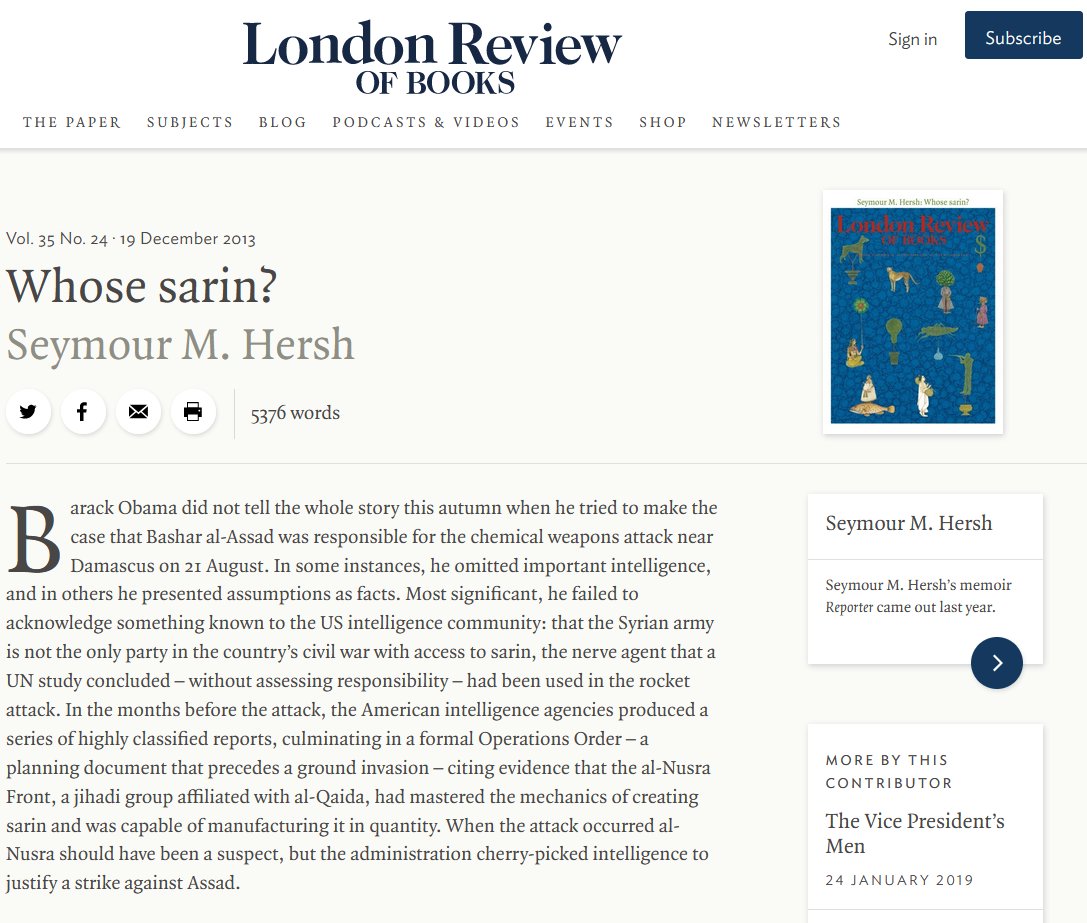In today's #vatnik soup I'll introduce an American investigative journalist and political writer, Seymour "Sy" Hersh. His recent article suggested that the Nord Stream bombing is connected to the US, Sweden and Norway and that it was ordered by no other than Joe Biden.
1/20
1/20

Let's begin with the obvious: Hersh is an accomplished journalist whose reporting is widely known around the world. His first big story was exposing the 1969 My Lai massacre and its cover-up during the Vietnam War.
2/20
2/20

In the 70s, he covered the Watergate scandal and in 2004 he reported on the torture and abuse of prisoners taking place in Abu Ghraib, Iraq. He's won 5 George Polk awards, a Pulitzer price and two National Magazine Awards.
3/20


3/20



But, then there's the other stuff. The kind of journalism that doesn't bear scrutiny.
In Sep, 2013, Hersh said in an interview that the death of Osama Bin Laden was "one big lie, not one word of it is true". In 2015 he published his own take on what happened in an ...
4/20
In Sep, 2013, Hersh said in an interview that the death of Osama Bin Laden was "one big lie, not one word of it is true". In 2015 he published his own take on what happened in an ...
4/20
... article called "The Killing of Osama bin Laden". He suggested that Pakistan had detained Bin Laden and both the Pakistani and the US governments knew about the attack beforehand. It was widely criticized by reporters, media commentators, academics and US official.
5/20

5/20


In Dec, 2013,London Review of Books published Hersh's article "Whose Sarin?".The article was previously rejected by both New Yorker & Washington Post. In his story,Seymour claimed that the US had used "cherry picked intel" to justify military attacks on pro-al-Assad troops.
6/20
6/20

Various chemical weapons experts were critical at the time, and latest OPCW report concluded that the "reasonable grounds" exist to believe that the Syrian Government was behind these attacks.
In 2017, Welt am Sonntag published Sy's article "Trump's Red Line"...
7/20
In 2017, Welt am Sonntag published Sy's article "Trump's Red Line"...
7/20

..., which suggested that the US intel had not informed President Trump that "it had found no evidence that the Syrians had used a chemical weapon". Bellingcat called Hersh's reporting "sloppy" as he based the case on tiny number of anonymous sources.
8/20

8/20


Regarding 9/11, Hersh has said in an interview that he doesn't "necessarily buy the story that Bin Laden was responsible for 9/11." Then he continued: "We really don't have an ending to the story. I’ve known people in the [intelligence] community. ...
9/20
9/20

... We don't know anything empirical about who did what."
Seymour's also been skeptical of the Skripal poisoning, saying that "the story of novichok poisoning has not held up very well. He [Skripal] was most likely talking to British intelligence services about Russian...
10/20
Seymour's also been skeptical of the Skripal poisoning, saying that "the story of novichok poisoning has not held up very well. He [Skripal] was most likely talking to British intelligence services about Russian...
10/20

... organised crime". He suggested that the poisoning was coming from organized crime rather than being state-sponsored.
Hersh is known for often using anonymous sources. He's also been criticized for this, and for example investigative journalist Edward Jay Epstein and...
11/20
Hersh is known for often using anonymous sources. He's also been criticized for this, and for example investigative journalist Edward Jay Epstein and...
11/20

... activist Amir Taheri have said that he is "over-reliant" on them. Taheri said that "by my count Hersh has anonymous 'sources' inside 30 foreign governments and virtually every department of the U.S. government".
12/20
12/20

In his story on Bin Laden, Hersh referred a 55 times to an "anonymous retired senior intelligence official". Vox's Max Fisher have stated that "Hersh has appeared increasingly to have gone off the rails. His stories, often alleging vast and shadowy conspiracies, ...
13/20
13/20

... have made startling-& often internally inconsistent- accusations,based on little or no proof beyond a handful of anonymous 'officials'".Slate's James Kirchick stated that "Hersh's problem is that he evinces no skepticism whatsoever toward what his crank sources tell him"14/20 

Hersh has defended his style of reporting, and has said that he may change details when he's giving speeches: "Sometimes I change events, dates, and places in a certain way to protect people. I can't fudge what I write. But I can certainly fudge what I say."
15/20
15/20

Hersh "fudged" facts in his 2004 speech about the Abu Ghraib scandal, where he alleged that American troops had sodomized young boys and that the whole thing was recorded. In a later interview, he said that his statement "wasn't that inaccurate, but it was misstated".
16/20
16/20

I have read Hersh's article on Nord Stream. It's a highly detailed blog post, describing the planning and the execution of the operation in detail.
Oliver Alexander (@OAlexanderDK) has researched Hersh's story on the Nord Stream bombing.
17/20
Oliver Alexander (@OAlexanderDK) has researched Hersh's story on the Nord Stream bombing.
17/20
Based on him and the OSINT evidence he's gathered, the story is full of holes and inaccuracies. One example:Hersh stated that a Norwegian Alta class mine hunter was used in the operation, but in reality the Alta hasn't been used since 2012 and was being scrapped at the time.18/20 

You can read Alexander's post here: oalexanderdk.substack.com/p/blowing-hole…
The reasons why Hersh has resorted to sloppy journalism can only be guessed. Maybe he wants to stay relevant? Maybe it's the money?
19/20
The reasons why Hersh has resorted to sloppy journalism can only be guessed. Maybe he wants to stay relevant? Maybe it's the money?
19/20
Either way, he should realize that his pieces riddled with dis- and misinformation are used as propaganda tools - On 15th of Feb, 2023, TASS reported that Russia requests UNSC meeting over the Nord Stream sabotage. Hersh has no plans to speak at the event if it occurs.
20/20
20/20

Addendum: Amir Taheri whom I referred in the report seems to be mixed in several controversial cases, too. The whole case seems to be a kind of "the pot calling the kettle black" scenario. I would disregard Taheri's comments on this matter.
• • •
Missing some Tweet in this thread? You can try to
force a refresh
































